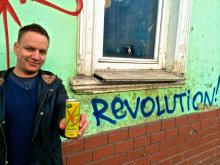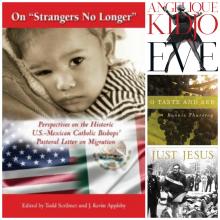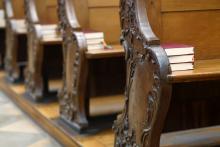Spirituality

Intending it as a compliment, a friend described my work in in Kiev last weekend as “selling sodas in Ukraine.”
He’s right. I was in the embattled city to represent a company I helped co-found and our Southern California energy drink brand in meetings with more than 10,000 Ukrainian independent business owners.
It was as simple as that and also so much more.
Like Bono, I believe free enterprise is a cure for all sorts of poverty — economic, political, and spiritual.




The Spirit’s Work
Just Jesus: My Struggle to Become Human, by Walter Wink with Steven Berry, is the final book by the late, influential Christian thinker. It blends brief autobiographical vignettes with essays on key themes in Wink’s work, offering insights into how his life story shaped his faith, thought, and witness. Image
Border Truths
On “Strangers No Longer”: Perspectives on the Historic U.S.-Mexican Catholic Bishops’ Pastoral Letter on Migration is a collection of essays by scholars and policy experts that uses the 2003 pastoral letter on immigration “Strangers No Longer: Together on the Journey of Hope” as its starting point. Paulist Press








I get asked questions sometimes that I feel are useful for a larger audience to consider and discuss. One such question was submitted to me by a reader a while back, which echoes the sentiments within many other similar questions I’ve received. Here’s the essence at the heart of those questions.
What do I do if I’m not sure what I believe?
First of all, don’t freak out. Most of the book of Ecclesiastes in the Old Testament is about a priest suffering a crisis of faith. And though some argue it was more a fulfillment of prophecy (quoting a psalm) rather than a personal cry of distress, it’s hard not to feel Jesus’ own existential suffering when he cries out from the cross for a God who seems to be missing.




FOR GENERATIONS, Native North Americans and other Indigenous peoples have lived the false belief that a fulfilled relationship with their Creator through Jesus required rejecting their own culture and adopting another, European in origin. In consequence, conventional approaches to mission with Indigenous peoples in North America and around the world have produced relatively dismal outcomes.
The result has subjected Indigenous people to deep-rooted self-doubt at best, self-hatred at worst.
One of the more egregious examples of the “conventional” approach in Canada involved the church-run residential schools. Indigenous children were taken from their families, prevented from speaking their native languages, and subjected to various other forms of abuse.
Isabelle Knockwood, a survivor of church-run residential schools, observed, “I thought about how many of my former schoolmates, like Leona, Hilda, and Maimie, had died premature deaths. I wondered how many were still alive and how they were doing, how well they were coping, and if they were still carrying the burden of the past on their shoulders like I was.”
Given the countless mission efforts over the past four centuries (which in practice were targeted not so much to spiritual transformation as to social and cultural annihilation), we might conclude that Indigenous people must possess a unique spiritual intransigence to the gospel.

INVITATIONS COME. Yet an expressed desire for your presence does not guarantee your willingness to show up. Invitations require a response. Some responses indicate significant commitment beyond “just showing up.” A summons may first entail an RSVP indicating a commitment to actually take an active part in the opportunity.
Such is the case for the people of God. Invitations arrived inviting God’s people to be witnesses to the power and presence of a particular God and to become a people who practice justice and favor kindness—peculiar expectations for an ancient culture, for any culture. A requirement of this sort unsettles the status quo of cultural mores where religion represents polytheistic attributions to a type of celestial Santa Claus or divine ATM, or where religion has been privatized—set aside from public prophetic witness to meditative reflection in the privacy of our own homes with occasional festive gatherings. Such genie-worship and privatization results in a deafening silence among the people of God. As Pope Francis put it recently, “a privatized lifestyle can lead Christians to take refuge in some false forms of spirituality.”
The promises that God calls us to are promises that Michael Frost, in Exiles, calls dangerous. They accompany dangerous memories that make a dangerous critique of society.
Over the next five weeks, the invitations extended in these texts indicate more than increasing the head count of seekers of spirituality. They require a response that signifies a commitment to participating in a community whose primary purpose is to expose the dangerous promise of God.

Tomorrow is Sunday. You know, the day when most Christians who bother to go to church with any regularity will get up on a perfectly good non-working morning and give their time to an institution that may or may not do them any favors. Catholics may have already gone to Mass on Friday or Saturday. The same with some people at Willow Creek.
The great thing about belonging to a Catholic Parish or a Mega-church is not having to go to church on Sunday. Okay, maybe there are other great things, but I think it's pretty swell.
